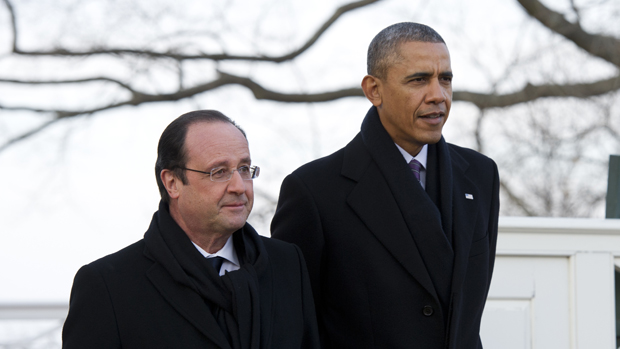France 'will not tolerate' threat to security after NSA 'spying'
Wikileaks publishes documents that allegedly show the NSA spied on Francois Hollande, Nicolas Sarkozy and Jacques Chirac

A free daily email with the biggest news stories of the day – and the best features from TheWeek.com
You are now subscribed
Your newsletter sign-up was successful
Francoise Hollande has said that France "will not tolerate" acts that threaten its security, following the emergence of leaked documents that purportedly show the US spied on the French president and his two immediate predecessors.
The documents, which were published last night by Wikileaks and two French newspapers, allegedly reveal the private conversations and deliberations of Hollande as well as former French presidents Nicolas Sarkozy and Jacques Chirac.
In a statement, the White House said that it was not presently spying on the French president, but did not address whether the National Security Agency had spied on him in the past.
The Week
Escape your echo chamber. Get the facts behind the news, plus analysis from multiple perspectives.

Sign up for The Week's Free Newsletters
From our morning news briefing to a weekly Good News Newsletter, get the best of The Week delivered directly to your inbox.
From our morning news briefing to a weekly Good News Newsletter, get the best of The Week delivered directly to your inbox.
"We do not conduct any foreign intelligence surveillance activities unless there is a specific and validated national security purpose," said Ned Price, White House National Security Council spokesman. "This applies to ordinary citizens and world leaders alike."
A statement from the French president said that the United States must respect its promise not to spy on French leaders, the BBC reports.
The documents claim to reveal private correspondence from Hollande in which the French president said that German Chancellor Angela Merkel was "fixated" on fiscal discipline and that he planned to go behind her back to talk to German opposition leaders soon after he was elected in 2012.
According to a summary of the correspondence, Hollande also began drawing up contingency plans in the event of a Greek exit from the EU in May 2012, when French officials did not publically acknowledge that Greece leaving the union was a possibility.
A free daily email with the biggest news stories of the day – and the best features from TheWeek.com
"The French president seems worried that if word were to get out that Paris is seriously considering the possibility of a Greek exit, it would deepen the crisis," the document reads.
The allegations contained in the documents are "likely to worsen simmering trans-Atlantic tensions over surveillance", the Wall Street Journal says.
Leaks from whistle-blower Edward Snowden in 2013 showed that the NSA tapped the mobile phone of allies including Angela Merkel.
The US said that it could not confirm the veracity of the latest reports.
-
 Political cartoons for February 16
Political cartoons for February 16Cartoons Monday’s political cartoons include President's Day, a valentine from the Epstein files, and more
-
 Regent Hong Kong: a tranquil haven with a prime waterfront spot
Regent Hong Kong: a tranquil haven with a prime waterfront spotThe Week Recommends The trendy hotel recently underwent an extensive two-year revamp
-
 The problem with diagnosing profound autism
The problem with diagnosing profound autismThe Explainer Experts are reconsidering the idea of autism as a spectrum, which could impact diagnoses and policy making for the condition
-
 Epstein files topple law CEO, roil UK government
Epstein files topple law CEO, roil UK governmentSpeed Read Peter Mandelson, Britain’s former ambassador to the US, is caught up in the scandal
-
 Iran and US prepare to meet after skirmishes
Iran and US prepare to meet after skirmishesSpeed Read The incident comes amid heightened tensions in the Middle East
-
 Israel retrieves final hostage’s body from Gaza
Israel retrieves final hostage’s body from GazaSpeed Read The 24-year-old police officer was killed during the initial Hamas attack
-
 China’s Xi targets top general in growing purge
China’s Xi targets top general in growing purgeSpeed Read Zhang Youxia is being investigated over ‘grave violations’ of the law
-
 Panama and Canada are negotiating over a crucial copper mine
Panama and Canada are negotiating over a crucial copper mineIn the Spotlight Panama is set to make a final decision on the mine this summer
-
 Why Greenland’s natural resources are nearly impossible to mine
Why Greenland’s natural resources are nearly impossible to mineThe Explainer The country’s natural landscape makes the task extremely difficult
-
 Iran cuts internet as protests escalate
Iran cuts internet as protests escalateSpeed Reada Government buildings across the country have been set on fire
-
 US nabs ‘shadow’ tanker claimed by Russia
US nabs ‘shadow’ tanker claimed by RussiaSpeed Read The ship was one of two vessels seized by the US military